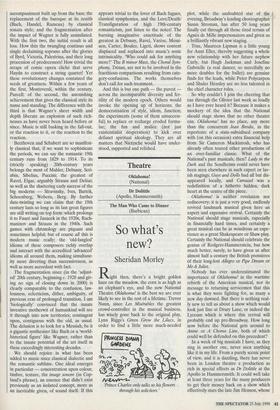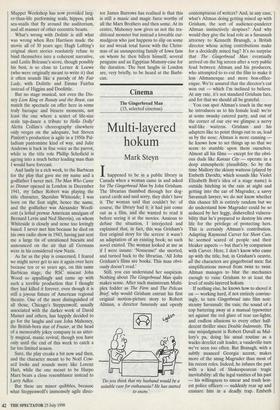Theatre Dr Dolittle (Apollo, Hammersmith) The Man Who Came to
Dinner (Barbican) Oklahoma! (National)
So what's new?
Sheridan Morley
Right then, there's a bright golden haze on the meadow, the corn is as high as an elephant's eye, and the new National Theatre Oklahoma! is the best we are ever likely to see in the rest of a lifetime. Trevor Nunn, since Les Miserables the greatest crowd-controller in the musical business, has wisely gone back to the original play, Lynn Riggs's Green Grow the Lilacs, in order to find a little more much-needed 'Prince Charles only talks to his flowers through his solicitors.' plot, while the undoubted star of the evening, Broadway's leading choreographer Susan Stroman, has after 50 long years finally cut through all those tired reruns of Agnes de Mille impersonators and given us a brilliantly vibrant new staging.
True, Maureen Lipman is a little young for Aunt Eller, thereby suggesting a whole new relationship with her future nephew Curly, but Hugh Jackman and Josefine Gabrielle (a real dancer, so mercifully no more doubles for the ballet) are genuine finds for the leads, while Peter Polycarpou and Shuler Hensley are no less talented in the chief character roles.
So why couldn't I join the cheering that ran through the Olivier last week as loudly as I have ever heard it? Because it makes a mockery of the idea that the National should stage shows that no other theatre can. Oklahoma! has no place, any more than the concurrent Jean Brodie, in the repertoire of a state-subsidised company with (on this occasion) extra financial help from Sir Cameron Mackintosh, who has already often toured other productions of an over-familiar classic. What of the National's past musicals, then? Lady in the Dark and the Sondheims could never have been seen elsewhere in such expert or lav- ish stagings; Guys and Dolls had all but dis- appeared locally, and Carousel was a redefinition of a hitherto hidden, dark heart at the centre of the piece.
Oklahoma! is neither revelation nor rediscovery; it is just a very good, endlessly revived landmark musical given here an expert and expensive revival. Certainly the National should stage musicals, especially in financially hard times, and certainly a great musical can be as wondrous an expe- rience as a great Shakespeare or Shaw play. Certainly the National should celebrate the genius of Rodgers-Hammerstein, but how much better, surely, to have given us after almost half a century the British premieres of their long-lost Allegro or Pipe Dream or Me & Juliet.
Nobody has ever underestimated the importance of Oklahoma! in the wartime rebirth of the American musical, nor its message to returning servicemen that this is what they were fighting for, as many a new day dawned. But there is nothing real- ly new to tell us about a show which would look just fine at Drury Lane, or indeed the Lyceum which is where this revival will probably end up pre-Broadway. How long now before the National gets around to Annie or A Chorus Line, both of which could well be defended on this precedent?
In a week of big musicals I have, as they sing in another one, never seen anything like it in my life. From a purely scenic point of view, and it is dazzling, there has never been in London theatre a production as rich in special effects as Dr Dolittle at the Apollo in Hammersmith. It could well take at least three years for the many producers to get their money back on a show which effectively stars the late Jim Henson, whose Muppet Workshop has now provided larg- er-than-life performing seals, hippos, pink sea-snails that fly around the auditorium, and all manner of other eccentric beasts.
What's wrong with Dolittle is still what was wrong when Rex Harrison made the movie all of 30 years ago; Hugh Lofting's original short stories resolutely refuse to bind themselves into a coherent narrative, and Leslie Bricusse's score, though possibly his best, is so close to Lerner & Loewe (who were originally meant to write it) that it often sounds like a parody of My Fair Lady, with Dolittle and Emma Fairfax instead of Higgins and Doolittle.
But no stage musical, not even the Dis- ney Lion King or Beauty and the Beast, can match the spectacle on offer here in some truly baroque and bizarre moments, not least the one where a sextet of life-size seals tap-dance a tribute to Hello Dolly! Aletta Collins's choreography elsewhere only verges on the adequate, but Steven Pimlott's production is agile in a 1950s Pal- ladium pantomime kind of way, and Julie Andrews is back in fine voice as the parrot, while in the title role Phillip Schofield is ageing into a much better leading man than I would have forecast.
And lastly in a rich week, to the Barbican for the play that gave me my name and a godfather I never met. The Man Who Came to Dinner opened in London in December 1941, my father Robert was playing the title character, Sheridan Whiteside; I was born on the first night, hence the name, and the godfather was Alexander Wooll- cott (a lethal prewar American amalgam of Bernard Levin and Ned Sherrin), on whom Whiteside is closely and none too lovingly based. I never met him because he died on his own radio show in 1943, having just sent me a large tin of unrationed biscuits and announced on the air that all Germans were in his considered view Nazis.
As far as the play is concerned, I feared we might never get to see it again over here because ten or so years ago, on this same Barbican stage, the RSC miscast John Wood so appallingly and came up with such a terrible production that I thought they had killed it forever, even though it is still a joyous fixture of American regional theatre. One of the most distinguished of all those, Chicago's Steppenwolf, usually associated with the darker work of David Mamet and others, has happily decided to go for the laughs and cast John Mahoney, the British-born star of Frasier, at the head of a memorably jokey company in an utter- ly magical, manic revival, though you have only until the end of this week to catch a far too limited season.
Sure, the play creaks a bit now and then, and the character meant to be Noel Cow- ard looks and sounds more like Lorenz Hart, while the one meant to be Harpo Marx bears a close resemblance instead to Larry Adler.
But these are minor quibbles, because what Steppenwolfs immensely agile direc- tor James Burrows has realised is that this is still a manic and magic farce worthy of all the Marx Brothers and then some. At its centre, Mahoney now gives us not the tra- ditional monster but instead a loveable cur- mudgeon who just happens to slip on some ice and wreak total havoc with the Christ- mas of an unsuspecting family of Iowa fans on whom he then billets himself, several penguins and an Egyptian Mummy-case for the duration. The best laughs in London are, very briefly, to be heard at the Barbi- can.



























































 Previous page
Previous page